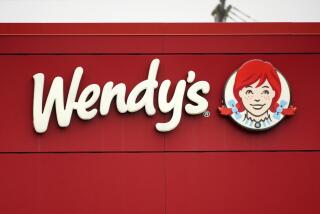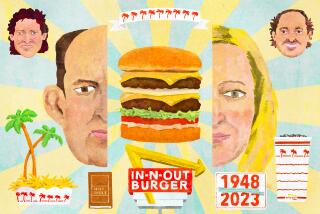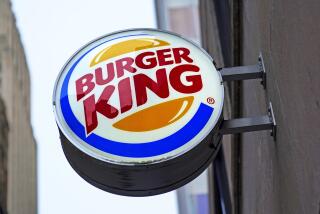Burger King’s Chief Is Trying His Own Hand at Cooking Up Sales
- Share via
There’s a joke making the rounds at Burger King that only one thing changes more frequently than its menu: its marketing staff.
Over the past decade, the rule of thumb at Burger King, the nation’s second-largest fast-food chain, has been a new marketing chief every couple of years. And true to form in February, Burger King, a unit of London’s Grand Metropolitan PLC, abruptly changed its marketing recipe once again when marketing chief Gary Langstaff resigned after two years. He was replaced--at least temporarily--by Burger King Chief Executive Barry J. Gibbons.
For Gibbons, 45, his marketing decisions over the next few months could determine not only his own future, but whether Burger King gets lost in the dust of its fast-food rivals. The chain’s sales rose about 7% in 1990, but analysts have been told to expect flat sales for the first quarter. When commenting on his strategy for Burger King’s turnaround in a recent speech, Gibbons wryly stated, “That’s assuming I have one.”
Certainly, he does. But it is a strategy that he appears more interested in getting rolling than talking about.
That is how Gibbons, who declined to be interviewed for this article, has always operated. Before joining Burger King in 1989, he was chairman and managing director of London-based Grand Metropolitan Retailing Ltd. during its biggest growth period. He oversaw 2,000 restaurant outlets employing 33,000 people in Britain, Germany and Switzerland. Before joining Grand Metropolitan in 1984, he held retail sales and marketing positions at Whitbread & Co. and Shell UK.
Recently, Gibbons began to quietly put into motion plans to bolster Burger King’s TV advertising budget and cut back on other marketing expenses such as promotions. By one estimate, up to three-fourths of the chain’s ad dollars will soon go directly into TV spots. The ads will promote quality--and value prices.
The price war is something Burger King’s former marketing chief Langstaff desperately wanted to avoid. “All it is, is a margin war that no one wins,” Langstaff said. “The day is coming when you’ll be able to buy a Big Mac and get a piece of McDonald’s with it.”
Langstaff denies it, but some industry insiders speculate that he was actually forced out as a “fall guy” during a period when Burger King’s business--like everyone else’s in the industry--is down. These same insiders say that while Langstaff and Gibbons saw eye to eye on the need for vast quality improvements at Burger King, they sharply disagreed on where to make those changes. What’s more, Gibbons was under tremendous pressure from franchisees.
The strategic thinking at Burger King these days is: The way to get people in the door is with low prices. At the same time, however, Gibbons believes that enough quality improvements have been made at Burger King to warrant ads that can finally deliver on their promises.
The 6,200-unit chain is expected to soon kill its “Sometimes you gotta break the rules” ad slogan and replace it with a slogan that rings back to the days when Burger King really could differentiate itself from archrival McDonald’s, “Your Way. Right Away.”
That move is clearly a gamble for Gibbons. Since taking the helm, Gibbons has tried valiantly to improve the experience of eating at Burger King--and to actually measure that improvement.
Among other things, the firm constantly snoops on employees and customers to make sure all is well. Shortly after Gibbons took control, Burger King started sending “mystery shoppers” to all units--company employees disguised as customers who report back to headquarters on quality. It also began sending unannounced “auditors” to the units to see that employees behind the counter were working up to corporate expectations.
“There was no way of measuring this before,” said Christopher Dams, Burger King’s senior vice president of quality. Dams, who was also at Grand Metropolitan, was hired by Gibbons.
It will still take time for Gibbons’ marketing strategy to turn around Burger King, Dams said. “You don’t turn a supertanker around in 100 yards. It takes five miles,” he said.
But Gibbons isn’t acting like a man who believes that he has five miles of leeway. “There is all this pressure on him to find a marketing fix by bringing in some sort of Wunderkind, “ said Peter Berlinsky, editor of Restaurant Business. “But the truth is, no one person makes or breaks a company the size of Burger King.”
More to Read
Eat your way across L.A.
Get our weekly Tasting Notes newsletter for reviews, news and more.
You may occasionally receive promotional content from the Los Angeles Times.









